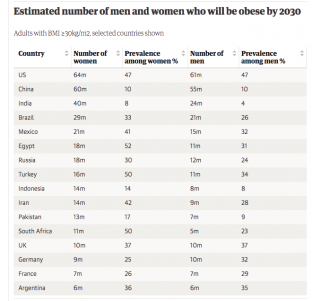This past Friday (4 March) marked World Obesity Day, a day focused on raising awareness about the disease, as well as emphasizing the importance of creating and promoting practical solutions to end the obesity epidemic. In lieu of this, a new report, published on Friday, produced by the World Obesity Federation revealed that not only is no country on track to meet the World Health Organization’s (WHO) target to halt obesity by 2025, but more than a billion people around the world are expected to be obese by 2030.
A Billion People Will Be Obese by 2030
The new findings, found in the fourth World Obesity Atlas, revealed the severity of the obesity epidemic. Obesity is a serious condition that can have ramifications for our health.

Guardian graphic. Source: World Obesity Atlas 2022
In addition to increasing one’s risk for heart disease and diabetes, the Centers for Disease Control and Prevention found that obesity can increase the risk of severe illness from COVID-19. Additionally, obesity may also triple the risk of hospitalization due to a COVID-19 infection. What’s more, over 900,000 adult COVID-19 hospitalizations occurred in the United States between the beginning of the pandemic and November 18, 2020, and models attributed 271,800 (30.2%) of these hospitalizations to obesity.
It’s clear that the obesity epidemic needs our attention and political and health leaders need to be prompted to action, especially because in the next eight years, the number of people living with obesity is expected to triple in low-income countries.
Which countries can expect the highest rates?
According to the report, the highest rates of obesity were found in North America, Latin and the Caribbean and 47% of people in the United States are likely to be obese by 2030. That said, the obesity rate is expected to triple in Africa.
In regards to gender disparities, women are expected to be more affected than men, with an estimated 74 million women in Africa to be living with obesity in 2030, compared with 27 million men in 2030. If we’re looking at it by country, the highest rates are expected to be in South Africa, with 50% of women predicted to be obese in 2030.

sirtravelalot/shutterstock
The report also revealed that the countries that are considered to be most prepared to deal with the potential increase are all classified as high-income. Considering the fact that 22% of non-communicable diseases in Africa are linked to obesity, which can be prevented, then it’s important that we act now, especially because lower-income countries are not adequately prepared enough to deal with the crisis.
“The numbers in our report are shocking, but what is even more shocking is how inadequate our response has been. Everyone has a basic right to prevention, treatment and management access which works for them. Now is the time for joined-up, decisive and people-centred action to turn the tide on obesity,” Johanna Ralston, World Obesity Federation Chief Executive Officer.
Tackling the obesity epidemic
“For too long we have all failed on obesity, and have witnessed generations of misunderstandings, fragmentation, underinvestment in and stigmatization of obesity and those affected by it,”
“As a result, the world is catastrophically now off track to meet the WHO 2025 obesity targets which all world leaders committed to in 2013. It is time to deliver a comprehensive, cohesive and integrated approach to prevent and treat obesity.” – John Wilding, World Obesity Federation President
In order to address the obesity epidemic, it’s first essential to understand what is causing it. According to Ralston, a shift in the consumption of unhealthy diets is to blame. Sadly, in many countries, policies around processed, high fat, and sugary foods are weak as opposed to more developed regions where there is more regulation and public awareness.

ESB Professional/Shutterstock
With that, over 175 obesity experts and advocates from around the world have signed an open letter to the world’s health leaders, calling on them to lend their support for a comprehensive, cohesive, and integrated approach to prevent and treat obesity, at the World Health Assembly in May 2022.
Now, while the world will likely miss the 2025 obesity target, World Obesity Federation CEO Johanna Ralston said that we shouldn’t lose faith,
“Every year we are increasing our scientific understanding of obesity, more people than ever are demanding action in their communities, and the recent momentum on securing WHO-led coordination through a Global Action Plan on Obesity means we should remain hopeful,” Ralston said.
“But the missed opportunity of the last decade should be a warning that success will only come if we all work together and invest in implementing and supporting comprehensive actions to prevent, manage and treat obesity throughout the life course.”
Want to know more?
According to the Cleveland Clinic, minimally invasive and scarless endoscopic procedures are offering hope when it comes to tackling the obesity pandemic.
References
Kompaniyets L, Agathis NT, Nelson JM, et al. (2021). Underlying Medical Conditions Associated With Severe COVID-19 Illness Among Children. JAMA Netw Open.4(6):e2111182. doi:10.1001/jamanetworkopen.2021.11182
Meghan O’Hearn MS [email protected] , Junxiu Liu PhD , Frederick Cudhea PhD , Renata Micha RD, PhD , and Dariush Mozaffarian MD, DrPH





![women [longevity live]](https://longevitylive.com/wp-content/uploads/2020/01/photo-of-women-walking-down-the-street-1116984-100x100.jpg)










